King Hussein bin Talal
1935-1999
(Click on pictures to see real
size versions - They might take a while to load)
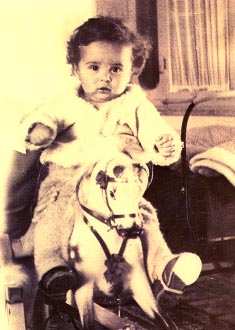 On
February 7th, 1999, King Hussein bin Talal, reigning monarch of
Jordan, died after a long battle with cancer. Within hours of his
death, and according to his father's will, his 37 y.o. son Abdullah
was sworn in as king, pledging forthwith to preserve King Hussein's
legacy. Most world leaders attended his funeral, but most striking
of all was the absolute disarray of the people of Jordan.
On
February 7th, 1999, King Hussein bin Talal, reigning monarch of
Jordan, died after a long battle with cancer. Within hours of his
death, and according to his father's will, his 37 y.o. son Abdullah
was sworn in as king, pledging forthwith to preserve King Hussein's
legacy. Most world leaders attended his funeral, but most striking
of all was the absolute disarray of the people of Jordan.  Obviously,
this man of peace, this proud Muslim in a time when many are focused
only on the images of fundamentalism, and this resolutely modern
monarch, was doing something right. Jungle Echoes would like to
give its readers a brief biography and chose to illustrate the man,
not only the king, by sharing some of his thoughts on topics most
of us also ponder on. There is also a
Obviously,
this man of peace, this proud Muslim in a time when many are focused
only on the images of fundamentalism, and this resolutely modern
monarch, was doing something right. Jungle Echoes would like to
give its readers a brief biography and chose to illustrate the man,
not only the king, by sharing some of his thoughts on topics most
of us also ponder on. There is also a  gallery
of portraits that shows the journey of this great statesman and
fascinating human being.
gallery
of portraits that shows the journey of this great statesman and
fascinating human being.
King Hussein was the longest serving executive
head of state in the world today. A symbolic leader to Muslims throughout
the world, he was also the 42nd generation direct descendant of
the Prophet Muhammad. He was born in 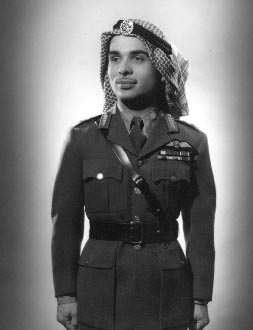 Amman
on November 14, 1935, to Prince Talal bin Abdullah and Princess
Zein al-Sharaf bint Jamil.
Amman
on November 14, 1935, to Prince Talal bin Abdullah and Princess
Zein al-Sharaf bint Jamil.
Early in his youth, and on July 20, 1951, his grandfather
King Abdullah was martyred at al-Aqsa mosque in al-Quds (Jerusalem).
On September 6, 1951, King Abdullah's eldest son, King Talal assumed
the throne. He was soon followed by his eldest son, Hussein, who
was proclaimed King of  the
Hashemite Kingdom of Jordan on August 11, 1952. A Regency Council
was appointed until King Hussein's formal accession to the throne
on May 2, 1953, when he took over his constitutional powers after
reaching the age of 18 according to the Islamic calendar. King Hussein
married Queen Noor on June 15, 1978.
the
Hashemite Kingdom of Jordan on August 11, 1952. A Regency Council
was appointed until King Hussein's formal accession to the throne
on May 2, 1953, when he took over his constitutional powers after
reaching the age of 18 according to the Islamic calendar. King Hussein
married Queen Noor on June 15, 1978.
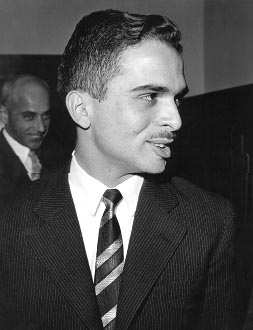 King
Hussein concentrated on building an economic and industrial infrastructure
that was modern, and always strove to improve the quality of life
of his people. He cared for his people and was revered in return.
Recently, when he saw how bad conditions were in a Jordanian orphanage,
he was said to have moved the orphans into one of his palaces so
that they would not have to live in squalor, and ordered a new orphanage
to be built to house the children.
King
Hussein concentrated on building an economic and industrial infrastructure
that was modern, and always strove to improve the quality of life
of his people. He cared for his people and was revered in return.
Recently, when he saw how bad conditions were in a Jordanian orphanage,
he was said to have moved the orphans into one of his palaces so
that they would not have to live in squalor, and ordered a new orphanage
to be built to house the children.
 Regionally,
he was a pivotal figure of the Middle-East peace negotiations, advocating
justice for all parties involved, often at the risk of his own life.
He also constantly worked to resolve disputes among Arab states.
During the 1990-91 Gulf Crisis, he exerted vigorous efforts to peacefully
achieve an Iraqi withdrawal and restore the sovereignty of Kuwait.
Regionally,
he was a pivotal figure of the Middle-East peace negotiations, advocating
justice for all parties involved, often at the risk of his own life.
He also constantly worked to resolve disputes among Arab states.
During the 1990-91 Gulf Crisis, he exerted vigorous efforts to peacefully
achieve an Iraqi withdrawal and restore the sovereignty of Kuwait.

He once said, on Communication
I have always believed that the
road to peace lies in genuine understanding between peoples. The
more we know about one another, the more we come to realize that,
in fact, we are not so different after all. As a truly global medium
of communication, the Internet is helping to replace barriers of
misunderstanding with bridges of  cooperation
and friendship.
cooperation
and friendship.
On Islam and Religion
I had realized from the outset
that vanity was a fatal affliction and that the 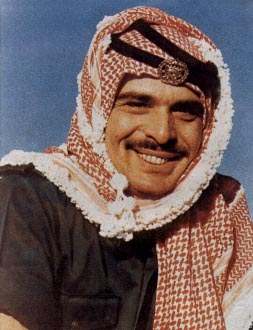 only
life worth adhering to, was one representing a journey of struggle
in the service of exalted values and noble aims, one that recognizes
that every living soul will meet its destined end, for which there
always is a good account. When the time comes, no hour could be
postponed or brought forward. The true believer is he who has faith
in the one God who has no partners, he who respects the rights and
freedoms of others, he who has lived his life in submission to God's
will, in gratitude for His countless blessings and in the conviction
that man can only do his best
only
life worth adhering to, was one representing a journey of struggle
in the service of exalted values and noble aims, one that recognizes
that every living soul will meet its destined end, for which there
always is a good account. When the time comes, no hour could be
postponed or brought forward. The true believer is he who has faith
in the one God who has no partners, he who respects the rights and
freedoms of others, he who has lived his life in submission to God's
will, in gratitude for His countless blessings and in the conviction
that man can only do his best 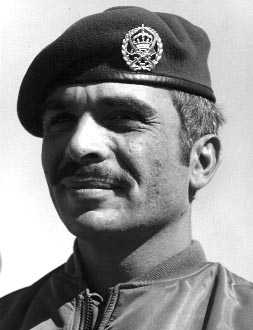 by
fulfilling his mission with honor and rectitude and through beseeching
God, ruler of the heavens and earth, to honor him with a verdict
in his favor by generations to come.
by
fulfilling his mission with honor and rectitude and through beseeching
God, ruler of the heavens and earth, to honor him with a verdict
in his favor by generations to come.
Address to the Nation
Amman
 November
5, 1992
November
5, 1992

What does a man seek in this
world? A position, or a throne? Man 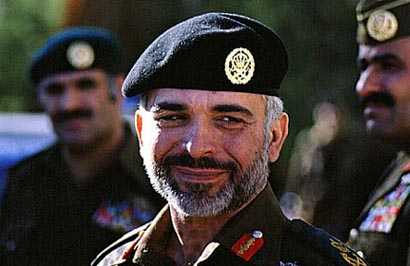 seeks
peace of mind and the fear of Almighty God. As long as one knows
that there is a judgement day, he tries to keep his conscience clear
and do what he can. People's trust is very dear, and one must be
up to it, not by trying to do what pleases people everywhere and
on every occasion, but by doing what satisfies one's conscience.
All what we hope for is that a day will
seeks
peace of mind and the fear of Almighty God. As long as one knows
that there is a judgement day, he tries to keep his conscience clear
and do what he can. People's trust is very dear, and one must be
up to it, not by trying to do what pleases people everywhere and
on every occasion, but by doing what satisfies one's conscience.
All what we hope for is that a day will  come,
when we have all gone, when people will say that this man has tried,
and his family tried. This is all there is to seek in this world.
come,
when we have all gone, when people will say that this man has tried,
and his family tried. This is all there is to seek in this world.
Fundamentalism as it is called
is not confined to the Muslim world. It is something that we have
seen in different parts of the world. Let us hope that a dialogue
between the followers of the  three
great monotheistic religions could help in putting an end to this.
three
great monotheistic religions could help in putting an end to this.
Interview with Euronews Television
July 1, 1995
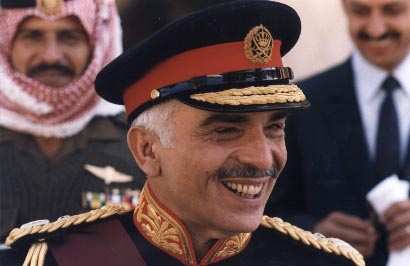
Our religion does not discriminate
according to color, sex or anything else. What counts is piety and
faith.
Address on the 45th Anniversary
of King Hussein's Assumption of his Constitutional Powers
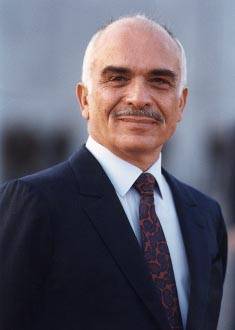 Amman
Amman
May 3, 1998
In general, I believe the judgment
that we receive comes after  our
death, based on what we have done in this life. It has to do with
the Almighty, and also with the judgment of people after we are
gone. I'm not for excess in anything, including so-called freedom.
But I would never appoint myself a judge; to say that because I
disapprove of how someone has behaved he is no longer a Muslim.
That is something that is beyond me or anyone else . . .
our
death, based on what we have done in this life. It has to do with
the Almighty, and also with the judgment of people after we are
gone. I'm not for excess in anything, including so-called freedom.
But I would never appoint myself a judge; to say that because I
disapprove of how someone has behaved he is no longer a Muslim.
That is something that is beyond me or anyone else . . .
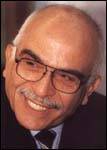 I
don't think that individual leaders have the right to determine
who lives and who dies. There are many ways of examining these matters.
I do not stand with much that is decreed, and sometimes followed
up by action, along these lines. I've read what Rushdie has written
and it was very deeply offensive and very deeply objectionable.
But I would not sanction murder and wouldn't expect anyone I know
to do that.
I
don't think that individual leaders have the right to determine
who lives and who dies. There are many ways of examining these matters.
I do not stand with much that is decreed, and sometimes followed
up by action, along these lines. I've read what Rushdie has written
and it was very deeply offensive and very deeply objectionable.
But I would not sanction murder and wouldn't expect anyone I know
to do that.
Interview with Milton Viorst
"The Hashemite Option"
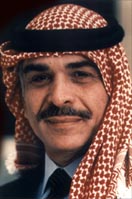 Chapter
10 of In the Shadow of the Prophet, 1998
Chapter
10 of In the Shadow of the Prophet, 1998
On Peace Based on Justice
Peace cannot be achieved unless
we are equals and based on mutual respect and true desire for its
establishment so that the future generations can benefit from it.
It is not a matter of bargaining over small matters. The issue at
hand is far bigger, and its dangers are real.
Interview with Radio Monte Carlo/Agence
France Presse
August 11, 1995
 Peace
which results from negotiations is permanent because it is the outcome
of mutual understanding and accommodation between the parties to
the conflict, but without sacrificing rights or deviating from the
principle of international legitimacy. For peace to be permanent
it must be balanced and not governed by a disparity between the
materially strong and weak. It must be founded on the basis of right
and justice and the common good of those who conclude it. This will,
therefore, insure that future generations will reap its benefits
and will protect it.
Peace
which results from negotiations is permanent because it is the outcome
of mutual understanding and accommodation between the parties to
the conflict, but without sacrificing rights or deviating from the
principle of international legitimacy. For peace to be permanent
it must be balanced and not governed by a disparity between the
materially strong and weak. It must be founded on the basis of right
and justice and the common good of those who conclude it. This will,
therefore, insure that future generations will reap its benefits
and will protect it.
Address to the Jordanian National
Congress
Amman
October 12, 1991
On the Rights of Women and Children
I am totally against the idea
that a Muslim woman should not have the same opportunities as a
Muslim man to learn, to open up, to work, help shape the future.
To close Islam down to a sexist approach is totally intolerable
and ridiculous. It's not Islam.
Interview with Milton Viorst
"The Hashemite Option"
Chapter 10 of In the Shadow
of the Prophet, 1998
The role of women today has become
more important and 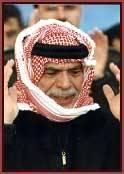 crucial
than at any other time. The Jordanian woman has excelled in the
field of education and succeeded in different professions and contributions
in the various organizations. Her support of official efforts to
serve society and develop the countryside has become stronger. She
also began to take part in the political life, becoming an important
pillar of the democratic structure. This is why we must all pay
serious attention to some of the dangerous phenomena that remain
a source of women's suffering, and which-unfortunately-constitute
an inhuman violation of their basic rights. The most serious and
dangerous of those is the visible and hidden violence, which was
the focus of many international conferences. This does not befit
our Arab and Islamic society: the society of solidarity. It is a
flagrant contradiction with our ongoing calls to preserve human
dignity and all human rights.
crucial
than at any other time. The Jordanian woman has excelled in the
field of education and succeeded in different professions and contributions
in the various organizations. Her support of official efforts to
serve society and develop the countryside has become stronger. She
also began to take part in the political life, becoming an important
pillar of the democratic structure. This is why we must all pay
serious attention to some of the dangerous phenomena that remain
a source of women's suffering, and which-unfortunately-constitute
an inhuman violation of their basic rights. The most serious and
dangerous of those is the visible and hidden violence, which was
the focus of many international conferences. This does not befit
our Arab and Islamic society: the society of solidarity. It is a
flagrant contradiction with our ongoing calls to preserve human
dignity and all human rights.
Speech from the Throne
Opening of the Thirteenth Parliament
Amman
November 29, 1997




















